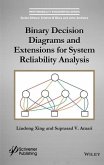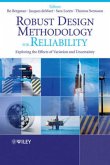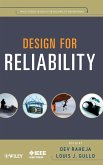- Gebundenes Buch
- Merkliste
- Auf die Merkliste
- Bewerten Bewerten
- Teilen
- Produkt teilen
- Produkterinnerung
- Produkterinnerung
Most existing robust design books address design for static systems, or achieve robust design from experimental data via the Taguchi method. Little work considers model information for robust design particularly for the dynamic system. This book covers robust design for both static and dynamic systems using the nominal model information or the hybrid model/data information, and also integrates design with control under a large operating region. This design can handle strong nonlinearity and more uncertainties from model and parameters.
Andere Kunden interessierten sich auch für
![Binary Decision Diagrams and Extensions for System Reliability Analysis Binary Decision Diagrams and Extensions for System Reliability Analysis]() Liudong XingBinary Decision Diagrams and Extensions for System Reliability Analysis181,99 €
Liudong XingBinary Decision Diagrams and Extensions for System Reliability Analysis181,99 €![Robust Design Methodology for Reliability Robust Design Methodology for Reliability]() Robust Design Methodology for Reliability154,99 €
Robust Design Methodology for Reliability154,99 €![Design for Reliability Design for Reliability]() Design for Reliability115,99 €
Design for Reliability115,99 €![Reliability Technology Reliability Technology]() Norman PascoeReliability Technology111,99 €
Norman PascoeReliability Technology111,99 €![Reliability Engineering Reliability Engineering]() Kailash C. KapurReliability Engineering144,99 €
Kailash C. KapurReliability Engineering144,99 €![Managing Power Electronics Managing Power Electronics]() Nazzareno RossettiManaging Power Electronics161,99 €
Nazzareno RossettiManaging Power Electronics161,99 €![Importance Measures in Reliability, Risk, and Optimization Importance Measures in Reliability, Risk, and Optimization]() Way KuoImportance Measures in Reliability, Risk, and Optimization129,99 €
Way KuoImportance Measures in Reliability, Risk, and Optimization129,99 €-
-
-
Most existing robust design books address design for static systems, or achieve robust design from experimental data via the Taguchi method. Little work considers model information for robust design particularly for the dynamic system. This book covers robust design for both static and dynamic systems using the nominal model information or the hybrid model/data information, and also integrates design with control under a large operating region. This design can handle strong nonlinearity and more uncertainties from model and parameters.
Produktdetails
- Produktdetails
- IEEE Press Series on Systems Science and Engineering
- Verlag: Wiley & Sons / Wiley-Blackwell
- 1. Auflage
- Seitenzahl: 264
- Erscheinungstermin: 27. Oktober 2014
- Englisch
- Abmessung: 240mm x 161mm x 19mm
- Gewicht: 566g
- ISBN-13: 9781118822265
- ISBN-10: 1118822269
- Artikelnr.: 40191841
- Herstellerkennzeichnung
- Libri GmbH
- Europaallee 1
- 36244 Bad Hersfeld
- gpsr@libri.de
- IEEE Press Series on Systems Science and Engineering
- Verlag: Wiley & Sons / Wiley-Blackwell
- 1. Auflage
- Seitenzahl: 264
- Erscheinungstermin: 27. Oktober 2014
- Englisch
- Abmessung: 240mm x 161mm x 19mm
- Gewicht: 566g
- ISBN-13: 9781118822265
- ISBN-10: 1118822269
- Artikelnr.: 40191841
- Herstellerkennzeichnung
- Libri GmbH
- Europaallee 1
- 36244 Bad Hersfeld
- gpsr@libri.de
Han-Xiong Li is a professor in the Department of Systems Engineering at the City University of Hong Kong. Dr. Li serves as Associate Editor of IEEE Transaction on Cybernetics, and IEEE Transactions on Industrial Electronics. Over the last thirty years, he has worked in different fields, including military service, industry, and academia. His current research interests are in systems intelligence and control, process design and control integration, and distributed parameter systems with applications to electronics packaging. XinJiang Lu is currently an associate professor with the School of Mechanical and Electrical Engineering at Central South University, People's Republic of China. He was awarded the Hiwin Doctoral Dissertation Award in 2011 and the New Century Excellent Talents Award by the Chinese Ministry of Education in 2013. His research interests include robust design, integration of design and control, and process modeling and control.
PREFACE xi
ACKNOWLEDGMENTS xiii
I BACKGROUND AND FUNDAMENTALS
1 INTRODUCTION 3
1.1 Background and Motivation 3
1.1.1 Robust Design for Static Systems 5
1.1.2 Robust Design for Dynamic Systems 8
1.1.3 Integration of Design and Control 10
1.2 Objectives of the Book 14
1.3 Contribution and Organization of the Book 15
2 OVERVIEW AND CLASSIFICATION 19
2.1 Classification of Uncertainty 19
2.2 Robust Performance Analysis 20
2.2.1 Interval Analysis 20
2.2.2 Fuzzy Analysis 21
2.2.3 Probabilistic Analysis 21
2.3 Robust Design 27
2.3.1 Robust Design for Static Systems 28
2.3.2 Robust Design for Dynamic Systems 37
2.4 Integration of Design and Control 41
2.4.1 Control Structure Design 41
2.4.2 Control Method 42
2.4.3 Optimization Method 43
2.5 Problems and Research Opportunities 43
II ROBUST DESIGN FOR STATIC SYSTEMS
3 VARIABLE SENSITIVITY BASED ROBUST DESIGN FOR NONLINEAR SYSTEM 47
3.1 Introduction 47
3.2 Design Problem for Nonlinear Systems 48
3.2.1 Problem in Deterministic Design 49
3.2.2 Problem in Probabilistic Design 49
3.3 Concept of Variable Sensitivity 51
3.4 Variable Sensitivity Based Deterministic Robust Design 52
3.4.1 Robust Design for Single Performance Single Variable 52
3.4.2 Robust Design for Multiperformances Multivariables 54
3.4.3 Design Procedure 58
3.5 Variable Sensitivity Based Probabilistic Robust Design 58
3.5.1 Single Performance Function Under Single Variables 59
3.5.2 Single Performance Function Under Multivariables 60
3.5.3 Multiperformance Functions Under Multivariables 61
3.6 Case Study 62
3.6.1 Deterministic Design Cases 62
3.6.2 Probabilistic Design Case 66
3.7 Summary 70
4 MULTI-DOMAIN MODELING-BASED ROBUST DESIGN 71
4.1 Introduction 71
4.2 Multi-Domain Modeling-Based Robust Design Methodology 73
4.2.1 Multi-Domain Modeling Approach 74
4.2.2 Variation Separation-Based Robust Design Method 75
4.2.3 Design Procedure 78
4.3 Case Study 80
4.3.1 Robust Design of a Belt 80
4.3.2 Robust Design of Hydraulic Press Machine 81
4.4 Summary 86
5 HYBRID MODEL DATA-BASED ROBUST DESIGN UNDER MODEL UNCERTAINTY 87
5.1 Introduction 87
5.2 Design Problem for Partially Unknown Systems 88
5.2.1 Probabilistic Robust Design Problem 88
5.2.2 Deterministic Robust Design Problem 90
5.3 Hybrid Model Data-Based Robust Design Methodology 92
5.3.1 Probabilistic Robust Design 93
5.3.2 Deterministic Robust Design 99
5.4 Case Study 104
5.4.1 Probabilistic Robust Design 104
5.4.2 Deterministic Robust Design 109
5.5 Summary 114
III ROBUST DESIGN FOR DYNAMIC SYSTEMS
6 ROBUST EIGENVALUE DESIGN UNDER PARAMETER VARIATION-A LINEARIZATION
APPROACH 119
6.1 Introduction 119
6.2 Dynamic Design Problem Under Parameter Variation 120
6.2.1 Stability Design Problem 120
6.2.2 Dynamic Robust Design Problem 121
6.3 Linearization-Based Robust Eigenvalue Design 122
6.3.1 Stability Design 122
6.3.2 Robust Eigenvalue Design 124
6.3.3 Tolerance Design 127
6.3.4 Design Procedure 128
6.4 Multi-Model-Based Robust Design Method for Stability and Robustness 128
6.4.1 Multi-Model Approach 129
6.4.2 Stability Design 130
6.4.3 Dynamic Robust Design 132
6.4.4 Summary 134
6.5 Case Studies 134
6.5.1 Linearization-Based Robust Eigenvalue Design 134
6.5.2 Multi-Model-Based Robust Design Method 138
6.6 Summary 145
7 ROBUST EIGENVALUE DESIGN UNDER PARAMETER VARIATION-A NONLINEAR APPROACH
147
7.1 Introduction 147
7.2 Design Problem 148
7.3 SN-Based Dynamic Design 150
7.3.1 Stability Design 152
7.3.2 Dynamic Robust Design 153
7.4 Case Study 160
7.4.1 Stability Design 160
7.4.2 Dynamic Robust Design 162
7.5 Summary 165
8 ROBUST EIGENVALUE DESIGN UNDER MODEL UNCERTAINTY 167
8.1 Introduction 167
8.2 Design Problem for Partially Unknown Dynamic Systems 168
8.3 Stability Design 169
8.3.1 Stability Design for Nominal Model 169
8.3.2 Stability Design Under Model Uncertainty 169
8.3.3 Stability Bound of Design Variables 171
8.4 Robust Eigenvalue Design and Tolerance Design 172
8.4.1 Robust Eigenvalue Design 172
8.4.2 Tolerance Design 173
8.4.3 Design Procedure 174
8.5 Case Study 175
8.5.1 Design of the Nominal Stability Space 175
8.5.2 Design of the Stability Space 176
8.5.3 Design of the Robust Stability Space 176
8.5.4 Robust Eigenvalue Design 176
8.5.5 Tolerance Design 177
8.5.6 Design Verification 177
8.6 Summary 180
IV INTEGRATION OF DESIGN AND CONTROL
9 DESIGN-FOR-CONTROL-BASED INTEGRATION 183
9.1 Introduction 183
9.2 Integration Problem 184
9.3 Design-for-Control-Based Integration Methodology 186
9.3.1 Design for Control 186
9.3.2 Control Development 188
9.3.3 Integration Optimization for Robust Pole Assignment 188
9.3.4 Integration Procedure 191
9.4 Case Study 192
9.4.1 Design for Control 192
9.4.2 Robust Pole Assignment 193
9.4.3 Design Verification 193
9.4.4 Design for Control 202
9.4.5 Robust Dynamic Design and Verification 202
9.5 Summary 204
10 INTELLIGENCE-BASED HYBRID INTEGRATION 205
10.1 Introduction 205
10.2 Problem in Hybrid System in Manufacturing 207
10.3 Intelligence-Based Hybrid Integration 208
10.3.1 Intelligent Process Control 208
10.3.2 Hybrid Integration Design 214
10.3.3 Hierarchical Optimization of Integration 215
10.4 Case Study 218
10.4.1 Objective 219
10.4.2 Integration Method for the Curing Process 220
10.4.3 Verification and Comparison 222
10.5 Summary 227
11 CONCLUSIONS 229
11.1 Summary and Conclusions 229
11.2 Challenge 231
REFERENCES 233
INDEX 245
ACKNOWLEDGMENTS xiii
I BACKGROUND AND FUNDAMENTALS
1 INTRODUCTION 3
1.1 Background and Motivation 3
1.1.1 Robust Design for Static Systems 5
1.1.2 Robust Design for Dynamic Systems 8
1.1.3 Integration of Design and Control 10
1.2 Objectives of the Book 14
1.3 Contribution and Organization of the Book 15
2 OVERVIEW AND CLASSIFICATION 19
2.1 Classification of Uncertainty 19
2.2 Robust Performance Analysis 20
2.2.1 Interval Analysis 20
2.2.2 Fuzzy Analysis 21
2.2.3 Probabilistic Analysis 21
2.3 Robust Design 27
2.3.1 Robust Design for Static Systems 28
2.3.2 Robust Design for Dynamic Systems 37
2.4 Integration of Design and Control 41
2.4.1 Control Structure Design 41
2.4.2 Control Method 42
2.4.3 Optimization Method 43
2.5 Problems and Research Opportunities 43
II ROBUST DESIGN FOR STATIC SYSTEMS
3 VARIABLE SENSITIVITY BASED ROBUST DESIGN FOR NONLINEAR SYSTEM 47
3.1 Introduction 47
3.2 Design Problem for Nonlinear Systems 48
3.2.1 Problem in Deterministic Design 49
3.2.2 Problem in Probabilistic Design 49
3.3 Concept of Variable Sensitivity 51
3.4 Variable Sensitivity Based Deterministic Robust Design 52
3.4.1 Robust Design for Single Performance Single Variable 52
3.4.2 Robust Design for Multiperformances Multivariables 54
3.4.3 Design Procedure 58
3.5 Variable Sensitivity Based Probabilistic Robust Design 58
3.5.1 Single Performance Function Under Single Variables 59
3.5.2 Single Performance Function Under Multivariables 60
3.5.3 Multiperformance Functions Under Multivariables 61
3.6 Case Study 62
3.6.1 Deterministic Design Cases 62
3.6.2 Probabilistic Design Case 66
3.7 Summary 70
4 MULTI-DOMAIN MODELING-BASED ROBUST DESIGN 71
4.1 Introduction 71
4.2 Multi-Domain Modeling-Based Robust Design Methodology 73
4.2.1 Multi-Domain Modeling Approach 74
4.2.2 Variation Separation-Based Robust Design Method 75
4.2.3 Design Procedure 78
4.3 Case Study 80
4.3.1 Robust Design of a Belt 80
4.3.2 Robust Design of Hydraulic Press Machine 81
4.4 Summary 86
5 HYBRID MODEL DATA-BASED ROBUST DESIGN UNDER MODEL UNCERTAINTY 87
5.1 Introduction 87
5.2 Design Problem for Partially Unknown Systems 88
5.2.1 Probabilistic Robust Design Problem 88
5.2.2 Deterministic Robust Design Problem 90
5.3 Hybrid Model Data-Based Robust Design Methodology 92
5.3.1 Probabilistic Robust Design 93
5.3.2 Deterministic Robust Design 99
5.4 Case Study 104
5.4.1 Probabilistic Robust Design 104
5.4.2 Deterministic Robust Design 109
5.5 Summary 114
III ROBUST DESIGN FOR DYNAMIC SYSTEMS
6 ROBUST EIGENVALUE DESIGN UNDER PARAMETER VARIATION-A LINEARIZATION
APPROACH 119
6.1 Introduction 119
6.2 Dynamic Design Problem Under Parameter Variation 120
6.2.1 Stability Design Problem 120
6.2.2 Dynamic Robust Design Problem 121
6.3 Linearization-Based Robust Eigenvalue Design 122
6.3.1 Stability Design 122
6.3.2 Robust Eigenvalue Design 124
6.3.3 Tolerance Design 127
6.3.4 Design Procedure 128
6.4 Multi-Model-Based Robust Design Method for Stability and Robustness 128
6.4.1 Multi-Model Approach 129
6.4.2 Stability Design 130
6.4.3 Dynamic Robust Design 132
6.4.4 Summary 134
6.5 Case Studies 134
6.5.1 Linearization-Based Robust Eigenvalue Design 134
6.5.2 Multi-Model-Based Robust Design Method 138
6.6 Summary 145
7 ROBUST EIGENVALUE DESIGN UNDER PARAMETER VARIATION-A NONLINEAR APPROACH
147
7.1 Introduction 147
7.2 Design Problem 148
7.3 SN-Based Dynamic Design 150
7.3.1 Stability Design 152
7.3.2 Dynamic Robust Design 153
7.4 Case Study 160
7.4.1 Stability Design 160
7.4.2 Dynamic Robust Design 162
7.5 Summary 165
8 ROBUST EIGENVALUE DESIGN UNDER MODEL UNCERTAINTY 167
8.1 Introduction 167
8.2 Design Problem for Partially Unknown Dynamic Systems 168
8.3 Stability Design 169
8.3.1 Stability Design for Nominal Model 169
8.3.2 Stability Design Under Model Uncertainty 169
8.3.3 Stability Bound of Design Variables 171
8.4 Robust Eigenvalue Design and Tolerance Design 172
8.4.1 Robust Eigenvalue Design 172
8.4.2 Tolerance Design 173
8.4.3 Design Procedure 174
8.5 Case Study 175
8.5.1 Design of the Nominal Stability Space 175
8.5.2 Design of the Stability Space 176
8.5.3 Design of the Robust Stability Space 176
8.5.4 Robust Eigenvalue Design 176
8.5.5 Tolerance Design 177
8.5.6 Design Verification 177
8.6 Summary 180
IV INTEGRATION OF DESIGN AND CONTROL
9 DESIGN-FOR-CONTROL-BASED INTEGRATION 183
9.1 Introduction 183
9.2 Integration Problem 184
9.3 Design-for-Control-Based Integration Methodology 186
9.3.1 Design for Control 186
9.3.2 Control Development 188
9.3.3 Integration Optimization for Robust Pole Assignment 188
9.3.4 Integration Procedure 191
9.4 Case Study 192
9.4.1 Design for Control 192
9.4.2 Robust Pole Assignment 193
9.4.3 Design Verification 193
9.4.4 Design for Control 202
9.4.5 Robust Dynamic Design and Verification 202
9.5 Summary 204
10 INTELLIGENCE-BASED HYBRID INTEGRATION 205
10.1 Introduction 205
10.2 Problem in Hybrid System in Manufacturing 207
10.3 Intelligence-Based Hybrid Integration 208
10.3.1 Intelligent Process Control 208
10.3.2 Hybrid Integration Design 214
10.3.3 Hierarchical Optimization of Integration 215
10.4 Case Study 218
10.4.1 Objective 219
10.4.2 Integration Method for the Curing Process 220
10.4.3 Verification and Comparison 222
10.5 Summary 227
11 CONCLUSIONS 229
11.1 Summary and Conclusions 229
11.2 Challenge 231
REFERENCES 233
INDEX 245
PREFACE xi
ACKNOWLEDGMENTS xiii
I BACKGROUND AND FUNDAMENTALS
1 INTRODUCTION 3
1.1 Background and Motivation 3
1.1.1 Robust Design for Static Systems 5
1.1.2 Robust Design for Dynamic Systems 8
1.1.3 Integration of Design and Control 10
1.2 Objectives of the Book 14
1.3 Contribution and Organization of the Book 15
2 OVERVIEW AND CLASSIFICATION 19
2.1 Classification of Uncertainty 19
2.2 Robust Performance Analysis 20
2.2.1 Interval Analysis 20
2.2.2 Fuzzy Analysis 21
2.2.3 Probabilistic Analysis 21
2.3 Robust Design 27
2.3.1 Robust Design for Static Systems 28
2.3.2 Robust Design for Dynamic Systems 37
2.4 Integration of Design and Control 41
2.4.1 Control Structure Design 41
2.4.2 Control Method 42
2.4.3 Optimization Method 43
2.5 Problems and Research Opportunities 43
II ROBUST DESIGN FOR STATIC SYSTEMS
3 VARIABLE SENSITIVITY BASED ROBUST DESIGN FOR NONLINEAR SYSTEM 47
3.1 Introduction 47
3.2 Design Problem for Nonlinear Systems 48
3.2.1 Problem in Deterministic Design 49
3.2.2 Problem in Probabilistic Design 49
3.3 Concept of Variable Sensitivity 51
3.4 Variable Sensitivity Based Deterministic Robust Design 52
3.4.1 Robust Design for Single Performance Single Variable 52
3.4.2 Robust Design for Multiperformances Multivariables 54
3.4.3 Design Procedure 58
3.5 Variable Sensitivity Based Probabilistic Robust Design 58
3.5.1 Single Performance Function Under Single Variables 59
3.5.2 Single Performance Function Under Multivariables 60
3.5.3 Multiperformance Functions Under Multivariables 61
3.6 Case Study 62
3.6.1 Deterministic Design Cases 62
3.6.2 Probabilistic Design Case 66
3.7 Summary 70
4 MULTI-DOMAIN MODELING-BASED ROBUST DESIGN 71
4.1 Introduction 71
4.2 Multi-Domain Modeling-Based Robust Design Methodology 73
4.2.1 Multi-Domain Modeling Approach 74
4.2.2 Variation Separation-Based Robust Design Method 75
4.2.3 Design Procedure 78
4.3 Case Study 80
4.3.1 Robust Design of a Belt 80
4.3.2 Robust Design of Hydraulic Press Machine 81
4.4 Summary 86
5 HYBRID MODEL DATA-BASED ROBUST DESIGN UNDER MODEL UNCERTAINTY 87
5.1 Introduction 87
5.2 Design Problem for Partially Unknown Systems 88
5.2.1 Probabilistic Robust Design Problem 88
5.2.2 Deterministic Robust Design Problem 90
5.3 Hybrid Model Data-Based Robust Design Methodology 92
5.3.1 Probabilistic Robust Design 93
5.3.2 Deterministic Robust Design 99
5.4 Case Study 104
5.4.1 Probabilistic Robust Design 104
5.4.2 Deterministic Robust Design 109
5.5 Summary 114
III ROBUST DESIGN FOR DYNAMIC SYSTEMS
6 ROBUST EIGENVALUE DESIGN UNDER PARAMETER VARIATION-A LINEARIZATION
APPROACH 119
6.1 Introduction 119
6.2 Dynamic Design Problem Under Parameter Variation 120
6.2.1 Stability Design Problem 120
6.2.2 Dynamic Robust Design Problem 121
6.3 Linearization-Based Robust Eigenvalue Design 122
6.3.1 Stability Design 122
6.3.2 Robust Eigenvalue Design 124
6.3.3 Tolerance Design 127
6.3.4 Design Procedure 128
6.4 Multi-Model-Based Robust Design Method for Stability and Robustness 128
6.4.1 Multi-Model Approach 129
6.4.2 Stability Design 130
6.4.3 Dynamic Robust Design 132
6.4.4 Summary 134
6.5 Case Studies 134
6.5.1 Linearization-Based Robust Eigenvalue Design 134
6.5.2 Multi-Model-Based Robust Design Method 138
6.6 Summary 145
7 ROBUST EIGENVALUE DESIGN UNDER PARAMETER VARIATION-A NONLINEAR APPROACH
147
7.1 Introduction 147
7.2 Design Problem 148
7.3 SN-Based Dynamic Design 150
7.3.1 Stability Design 152
7.3.2 Dynamic Robust Design 153
7.4 Case Study 160
7.4.1 Stability Design 160
7.4.2 Dynamic Robust Design 162
7.5 Summary 165
8 ROBUST EIGENVALUE DESIGN UNDER MODEL UNCERTAINTY 167
8.1 Introduction 167
8.2 Design Problem for Partially Unknown Dynamic Systems 168
8.3 Stability Design 169
8.3.1 Stability Design for Nominal Model 169
8.3.2 Stability Design Under Model Uncertainty 169
8.3.3 Stability Bound of Design Variables 171
8.4 Robust Eigenvalue Design and Tolerance Design 172
8.4.1 Robust Eigenvalue Design 172
8.4.2 Tolerance Design 173
8.4.3 Design Procedure 174
8.5 Case Study 175
8.5.1 Design of the Nominal Stability Space 175
8.5.2 Design of the Stability Space 176
8.5.3 Design of the Robust Stability Space 176
8.5.4 Robust Eigenvalue Design 176
8.5.5 Tolerance Design 177
8.5.6 Design Verification 177
8.6 Summary 180
IV INTEGRATION OF DESIGN AND CONTROL
9 DESIGN-FOR-CONTROL-BASED INTEGRATION 183
9.1 Introduction 183
9.2 Integration Problem 184
9.3 Design-for-Control-Based Integration Methodology 186
9.3.1 Design for Control 186
9.3.2 Control Development 188
9.3.3 Integration Optimization for Robust Pole Assignment 188
9.3.4 Integration Procedure 191
9.4 Case Study 192
9.4.1 Design for Control 192
9.4.2 Robust Pole Assignment 193
9.4.3 Design Verification 193
9.4.4 Design for Control 202
9.4.5 Robust Dynamic Design and Verification 202
9.5 Summary 204
10 INTELLIGENCE-BASED HYBRID INTEGRATION 205
10.1 Introduction 205
10.2 Problem in Hybrid System in Manufacturing 207
10.3 Intelligence-Based Hybrid Integration 208
10.3.1 Intelligent Process Control 208
10.3.2 Hybrid Integration Design 214
10.3.3 Hierarchical Optimization of Integration 215
10.4 Case Study 218
10.4.1 Objective 219
10.4.2 Integration Method for the Curing Process 220
10.4.3 Verification and Comparison 222
10.5 Summary 227
11 CONCLUSIONS 229
11.1 Summary and Conclusions 229
11.2 Challenge 231
REFERENCES 233
INDEX 245
ACKNOWLEDGMENTS xiii
I BACKGROUND AND FUNDAMENTALS
1 INTRODUCTION 3
1.1 Background and Motivation 3
1.1.1 Robust Design for Static Systems 5
1.1.2 Robust Design for Dynamic Systems 8
1.1.3 Integration of Design and Control 10
1.2 Objectives of the Book 14
1.3 Contribution and Organization of the Book 15
2 OVERVIEW AND CLASSIFICATION 19
2.1 Classification of Uncertainty 19
2.2 Robust Performance Analysis 20
2.2.1 Interval Analysis 20
2.2.2 Fuzzy Analysis 21
2.2.3 Probabilistic Analysis 21
2.3 Robust Design 27
2.3.1 Robust Design for Static Systems 28
2.3.2 Robust Design for Dynamic Systems 37
2.4 Integration of Design and Control 41
2.4.1 Control Structure Design 41
2.4.2 Control Method 42
2.4.3 Optimization Method 43
2.5 Problems and Research Opportunities 43
II ROBUST DESIGN FOR STATIC SYSTEMS
3 VARIABLE SENSITIVITY BASED ROBUST DESIGN FOR NONLINEAR SYSTEM 47
3.1 Introduction 47
3.2 Design Problem for Nonlinear Systems 48
3.2.1 Problem in Deterministic Design 49
3.2.2 Problem in Probabilistic Design 49
3.3 Concept of Variable Sensitivity 51
3.4 Variable Sensitivity Based Deterministic Robust Design 52
3.4.1 Robust Design for Single Performance Single Variable 52
3.4.2 Robust Design for Multiperformances Multivariables 54
3.4.3 Design Procedure 58
3.5 Variable Sensitivity Based Probabilistic Robust Design 58
3.5.1 Single Performance Function Under Single Variables 59
3.5.2 Single Performance Function Under Multivariables 60
3.5.3 Multiperformance Functions Under Multivariables 61
3.6 Case Study 62
3.6.1 Deterministic Design Cases 62
3.6.2 Probabilistic Design Case 66
3.7 Summary 70
4 MULTI-DOMAIN MODELING-BASED ROBUST DESIGN 71
4.1 Introduction 71
4.2 Multi-Domain Modeling-Based Robust Design Methodology 73
4.2.1 Multi-Domain Modeling Approach 74
4.2.2 Variation Separation-Based Robust Design Method 75
4.2.3 Design Procedure 78
4.3 Case Study 80
4.3.1 Robust Design of a Belt 80
4.3.2 Robust Design of Hydraulic Press Machine 81
4.4 Summary 86
5 HYBRID MODEL DATA-BASED ROBUST DESIGN UNDER MODEL UNCERTAINTY 87
5.1 Introduction 87
5.2 Design Problem for Partially Unknown Systems 88
5.2.1 Probabilistic Robust Design Problem 88
5.2.2 Deterministic Robust Design Problem 90
5.3 Hybrid Model Data-Based Robust Design Methodology 92
5.3.1 Probabilistic Robust Design 93
5.3.2 Deterministic Robust Design 99
5.4 Case Study 104
5.4.1 Probabilistic Robust Design 104
5.4.2 Deterministic Robust Design 109
5.5 Summary 114
III ROBUST DESIGN FOR DYNAMIC SYSTEMS
6 ROBUST EIGENVALUE DESIGN UNDER PARAMETER VARIATION-A LINEARIZATION
APPROACH 119
6.1 Introduction 119
6.2 Dynamic Design Problem Under Parameter Variation 120
6.2.1 Stability Design Problem 120
6.2.2 Dynamic Robust Design Problem 121
6.3 Linearization-Based Robust Eigenvalue Design 122
6.3.1 Stability Design 122
6.3.2 Robust Eigenvalue Design 124
6.3.3 Tolerance Design 127
6.3.4 Design Procedure 128
6.4 Multi-Model-Based Robust Design Method for Stability and Robustness 128
6.4.1 Multi-Model Approach 129
6.4.2 Stability Design 130
6.4.3 Dynamic Robust Design 132
6.4.4 Summary 134
6.5 Case Studies 134
6.5.1 Linearization-Based Robust Eigenvalue Design 134
6.5.2 Multi-Model-Based Robust Design Method 138
6.6 Summary 145
7 ROBUST EIGENVALUE DESIGN UNDER PARAMETER VARIATION-A NONLINEAR APPROACH
147
7.1 Introduction 147
7.2 Design Problem 148
7.3 SN-Based Dynamic Design 150
7.3.1 Stability Design 152
7.3.2 Dynamic Robust Design 153
7.4 Case Study 160
7.4.1 Stability Design 160
7.4.2 Dynamic Robust Design 162
7.5 Summary 165
8 ROBUST EIGENVALUE DESIGN UNDER MODEL UNCERTAINTY 167
8.1 Introduction 167
8.2 Design Problem for Partially Unknown Dynamic Systems 168
8.3 Stability Design 169
8.3.1 Stability Design for Nominal Model 169
8.3.2 Stability Design Under Model Uncertainty 169
8.3.3 Stability Bound of Design Variables 171
8.4 Robust Eigenvalue Design and Tolerance Design 172
8.4.1 Robust Eigenvalue Design 172
8.4.2 Tolerance Design 173
8.4.3 Design Procedure 174
8.5 Case Study 175
8.5.1 Design of the Nominal Stability Space 175
8.5.2 Design of the Stability Space 176
8.5.3 Design of the Robust Stability Space 176
8.5.4 Robust Eigenvalue Design 176
8.5.5 Tolerance Design 177
8.5.6 Design Verification 177
8.6 Summary 180
IV INTEGRATION OF DESIGN AND CONTROL
9 DESIGN-FOR-CONTROL-BASED INTEGRATION 183
9.1 Introduction 183
9.2 Integration Problem 184
9.3 Design-for-Control-Based Integration Methodology 186
9.3.1 Design for Control 186
9.3.2 Control Development 188
9.3.3 Integration Optimization for Robust Pole Assignment 188
9.3.4 Integration Procedure 191
9.4 Case Study 192
9.4.1 Design for Control 192
9.4.2 Robust Pole Assignment 193
9.4.3 Design Verification 193
9.4.4 Design for Control 202
9.4.5 Robust Dynamic Design and Verification 202
9.5 Summary 204
10 INTELLIGENCE-BASED HYBRID INTEGRATION 205
10.1 Introduction 205
10.2 Problem in Hybrid System in Manufacturing 207
10.3 Intelligence-Based Hybrid Integration 208
10.3.1 Intelligent Process Control 208
10.3.2 Hybrid Integration Design 214
10.3.3 Hierarchical Optimization of Integration 215
10.4 Case Study 218
10.4.1 Objective 219
10.4.2 Integration Method for the Curing Process 220
10.4.3 Verification and Comparison 222
10.5 Summary 227
11 CONCLUSIONS 229
11.1 Summary and Conclusions 229
11.2 Challenge 231
REFERENCES 233
INDEX 245








